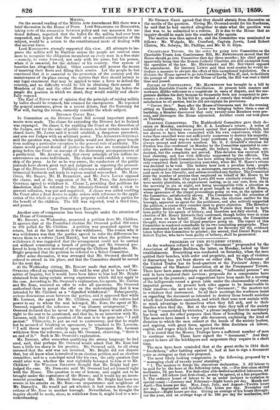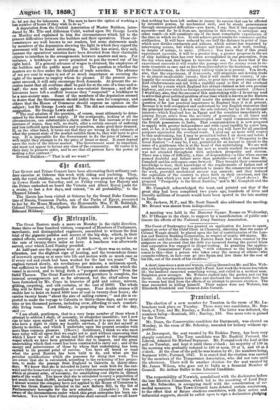PROGRESS OF THE BUILDERS' STRIKE.
As the workmen refused to sign the " document " propounded by the Association of Mester Builders, the latter, on Monday, locked up their establishments. Everything was conducted on Saturday, when the men quitted their benches, with order and propriety, and no sign of violence or discourtesy has yet been shown on either side. The Conference of the United Trades has its head-quarters at the Paviours' Arms ; the Committee of the Masters' Association sit at the Freemasons' Tavern. There have been some attempts at mediation; "influential persons" are said to have tendered their services ; proposals for a compromise have appeared in the journals ; and suggestions have been made for a meeting of the belligerents round a green table under the chairmanship of some impartial person. At present both sides appear to be immoveable in their resolves—the men not to sign the "document ; " the masters not to withdraw that instrument. In all their meetings the workmen insist on regarding the document as intended to destroy those benefit societies which their forefathers sustained, and which their sons now sustain with so much advantage to themselves when they fall sick, and to their families when they die. But at the same time they talk of the society as being " consecrated by victories," a phrase implying that its machinery has been used for other purposes than those of benefiting its members. The masters have issued a very able document, explaining the kind of dictation to which the men submit at the hands of the society leaders, and arguing, with great force, against the false doctrines on labour, capital, and wages which the men put forward.
It is stated that the Messrs. Trollope have a sufficient number of men to continue work. These have signed the " document." And they expect to have all the bricklayers and carpenters they require in a short time. The men have been reminded that at the great strike in 1834 their " forefathers," after battling against it, had at last to sign a document quite as stringent as that now proposed. The most likely looking compromise is the following, proposed by a " managing clerk of twenty years' standing."
" 1. The masters to forego the obnoxious declaration. 2. All labour to be paid for by the hour at the following rates, viz. :—For first-class skilled mechanics, 7d. per hour. For first-class able-bodied unskilled labourers, 4d. per hour. All others (not first-class), as may be agreed, at a fair proportion. 3. The ordinary hours of labour to be as under (subject to variation in special cases) :—January and February—Eight hours per day. March and April—Ten hours per day. May, June, July, and August—Twelve hours per day. September and October—Ten hours per day. November and December—Eight hours per day. Giving an average of ten hours through- out the year, and an average wage of 6s. 10d. per day for mechanics, and
3s. 4d. per day for labourers. 4. The men to have the option of working a less number of hours if they wish to do so."
A deputation from the Central Association of Master Builders, intro- duced by Mr. Tite and Alderman Cubit, waited upon Sir George Lewis on Monday and explained to him the circumstances which led to the present difficulties between the builders and their operatives. Those cir- cumstances are well known to cur readers, but some statements made by members of the deputation showing the light in which they regard the movement will be found interesting. The strike has arisen, they said, because the operatives' societies have been diverted from their charitable objects to interfere in the arrangements between masters and men. For instance, a bricklayer is never permitted to put the trowel out of his right hand. If a general advance of wages is obtained, the employers of the builders and the public must pay it. The question is whether the masters are to live under the thraldom of trade societies. The advance of ten per cent in wages is not of so much importance as securing the right of the master to employ whom he pleases. If the present move- ment succeed, it will only encourage fresh demands. At present the so- cieties insist that all overtime shall be paid for at the rate of a time-and-a- half ; the men will strike against a non-unionist foreman ; and all the labourers have left a scaffold because they "suspected" a bricklayer to be a non-society man. Some of the members of the deputation seemed to desire that the Government should indict the men for conspiracy, and others that the House of Commons should express an opinion on the sabject ; but Sir George Lewis and Mr. Tite did not countenance either sugg.estion. Sir George Lewis said-
irThe real solution of the question, of course, must ultimately be deter- mined by the demand and supply. If the workpeople, looking at all the circumstances, can substantiate a claim either for this increase or for any increase of wages, they will, no doubt, after a certain amount of suffering and loss inflicted upon themselves and yourselves, make good their demand. If on the other hand, it turns out that they are wrong in their estimate of what the present state of the market entitles them to, they will have to give way. It is impossible for the Government to fix the price of labour; as well might they attempt to fix the price of bread or meat. It must depend upon the state of the labour market. The Government must be impartial, and must not appear to favour any class of the community. Of course it is their duty to preserve order, and to see that all persons have the power of making a free contract." Several Builders—" That is all we want."



























 Previous page
Previous page